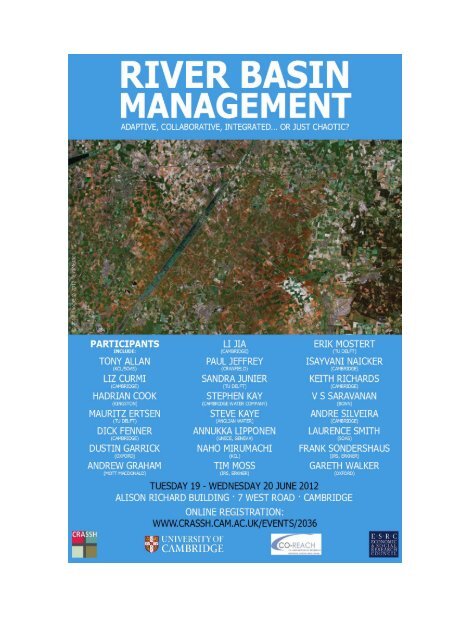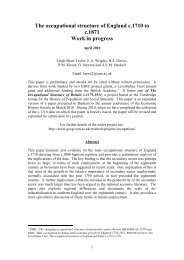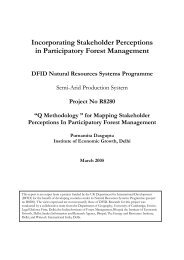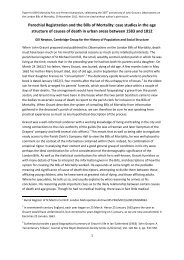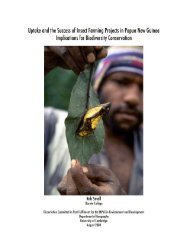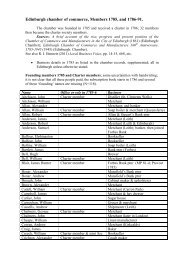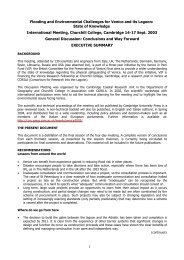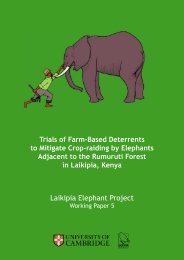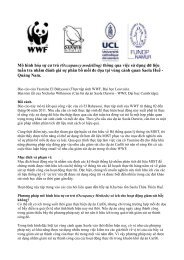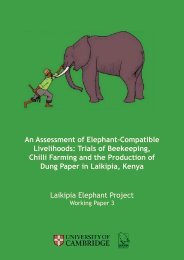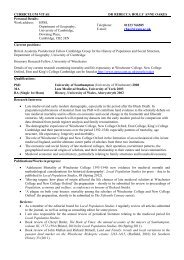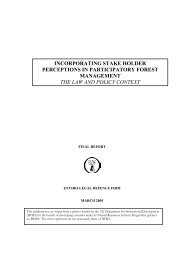Workshop booklet including programme and participant list
Workshop booklet including programme and participant list
Workshop booklet including programme and participant list
You also want an ePaper? Increase the reach of your titles
YUMPU automatically turns print PDFs into web optimized ePapers that Google loves.
River Basin Management: Adaptive, Collaborative, Integrated.. or just Chaotic?<br />
CRASSH, Cambridge. Tuesday 19th-Wednesday 20th June 2012<br />
The purpose of this <strong>Workshop</strong> is to bring together academics, practitioners <strong>and</strong><br />
graduate students with an interest in issues of river basin <strong>and</strong> water management. The<br />
aim will be to explore the possibilities for management of these complex socialtechnical-ecological<br />
systems – whether integrated, adaptive or collaborative – <strong>and</strong> the<br />
continuing challenges thereof, from theoretical, multi-disciplinary <strong>and</strong> practical<br />
perspectives, <strong>and</strong> in relation to basins of varying scale from the more-or-less local to<br />
the trans-boundary. The workshop will consider multiple perspectives on basin<br />
management - ecological, social, technical <strong>and</strong> economic - to address the inherent<br />
complexities, trade-offs <strong>and</strong> multiple disciplinary approaches involved in identifying<br />
effective solutions to the need to maintain healthy aquatic environments while<br />
delivering sustainable water services.<br />
The workshop will cover two days, in each of which there will be two themes. On<br />
Tuesday 19th June the sessions will be more theoretical; the morning will introduce the<br />
overall workshop theme of "Water management: multi-level, polycentric, adaptive,<br />
collaborative.. or just chaotic?" by considering the complex, path dependent nature of<br />
basin management, <strong>and</strong> the difficulties of generalising from case studies <strong>and</strong><br />
experience. The afternoon will develop this theme by considering the questions of<br />
"Learning, transferring, adapting: water management across space <strong>and</strong> time". On<br />
Wednesday 20th June, the sessions will have a more practical orientation, <strong>and</strong> will<br />
cover "New methods for water management" <strong>and</strong> “New challenges, responses <strong>and</strong><br />
institutional arrangements in urban water management"<br />
Each theme will occupy three-<strong>and</strong>-a-half hours, <strong>and</strong> will have a similar structure. It<br />
will begin with two invited talks on the theme, each of 20 minutes with an additional<br />
10 minutes each for discussion. There will then be 15 minutes to introduce the<br />
topics/questions for a series of related break-out groups, <strong>and</strong> after a further 15 minutes<br />
for coffee or tea, the break-out groups (c.4 in number) will convene. Each break-out<br />
group will have a convenor who will provide an introduction of 10-15 minutes, with<br />
50-45 minutes for discussion of this, <strong>and</strong> its relation to the introductory talks. There<br />
will then be a plenary session in which rapporteurs present 10 minute summaries of<br />
each group's discussions. There will be four breakout groups with 10-12 <strong>participant</strong>s in<br />
each.<br />
The <strong>Workshop</strong> is the concluding event of a series of international <strong>Workshop</strong>s held in<br />
Cambridge, Macau, Guangzhou <strong>and</strong> Beijing from 2009 on the theme of River Basin<br />
Governance (RiBaGo) in China <strong>and</strong> Europe, supported by the Co-Reach initiative of<br />
the ERA, <strong>and</strong> the ESRC. Details are available at:<br />
http://www.geog.cam.ac.uk/research/projects/ribago/<br />
Financial support for this <strong>Workshop</strong> from the Co-Reach initiative <strong>and</strong> the University of<br />
Cambridge is gratefully acknowledged.
Rooms<br />
All plenary events (Introductory Lectures <strong>and</strong> Rapporteur Summaries) will take place<br />
in SG1<br />
Breakout Seminars will be in the following rooms:<br />
Seminar B1<br />
Seminar B2<br />
All four sessions - SG1<br />
All four sessions - SG2<br />
Seminar B3 All Tuesday, <strong>and</strong> Wednesday morning -<br />
CRASSH Meeting Room<br />
Wednesday afternoon - Room S3, 3rd Floor<br />
Seminar B4<br />
All of Tuesday - Room 204 (to the left, 2nd<br />
Floor)<br />
Wednesday morning - Room S3, 3rd Floor
TUESDAY 19th JUNE<br />
Programme<br />
09.15-09.45 Coffee <strong>and</strong> Registration<br />
09.45-10.00 Introduction to the <strong>Workshop</strong><br />
Session 1 - 10.00-13.30<br />
Water management: multi-level, polycentric, adaptive, collaborative.. or just<br />
chaotic?<br />
This first session will involve two invited talks on the theme of river basin <strong>and</strong> water<br />
management, from the supra-national to the local, <strong>and</strong> on how far in different<br />
jurisdictions <strong>and</strong> at different scales it displays multi-level, polycentric, adaptive, or<br />
collaborative characteristics; or simply a chaotic self-organisation reflecting the<br />
historic evolution of a complex dynamic social-ecological system. How far are our<br />
conceptions of structural organisation in these institutions theoretical idealisations<br />
remote from the empirical reality of the path-dependent functioning of basin<br />
management?<br />
A. Introductory lectures (20 minute talk, 10 minute discussion): (10.00-11.00)<br />
1. Erik Mostert (TU Delft)<br />
What can we learn from the River Rhine?<br />
This paper will examine the key issues of this session, using one particular example:<br />
the management of the Rhine basin at the international, national (Dutch) <strong>and</strong> local<br />
level. Moreover, it will discuss the relevance of the experiences in the Rhine basin for<br />
other basins. Finally, it will sketch the outlines of a more complete empirical theory on<br />
river basin management, as well as how to develop such a theory. Detailed case studies<br />
will play a key role in this.<br />
2. Tim Moss (IRS, Erkner, Berlin)<br />
Researching institutional <strong>and</strong> political contexts of water resources management<br />
This paper will summarise critiques of IWRM, set out the need for greater sensitivity<br />
to spatial <strong>and</strong> political contexts in promoting more integrated WRM, <strong>and</strong> present the<br />
methodology developed in the WaRM-In project (Strengthening Integrated Water<br />
Resource Management through institutional analysis: an analytical tool <strong>and</strong> operative<br />
methodology for research projects <strong>and</strong> <strong>programme</strong>s)<br />
Break-out arrangements <strong>and</strong> coffee (11.00-11.30)<br />
B. Parallel break-out seminars (15 minute talk followed by discussion): (11.30-<br />
12.30)<br />
1. Dustin Garrick (Oxford)<br />
The public economy of river basin governance: insights from polycentric governance<br />
<strong>and</strong> transaction costs economics<br />
We will consider why integration <strong>and</strong> adaptation have often proved elusive in large<br />
river basins, combining analytical insights from two related theoretical traditions often<br />
examined independently: polycentric governance theory <strong>and</strong> transaction costs<br />
economics. Polycentric governance theory examines cooperation, competition <strong>and</strong><br />
conflict across (vertical) <strong>and</strong> within (horizontal) multiple political levels. Transaction<br />
costs economics examines institutional frictions inhibiting cross-scale integration.
River basin governance reforms in Australia <strong>and</strong> the Western US will illustrate the<br />
theoretical <strong>and</strong> analytical insights from these two related fields of research.<br />
Questions to consider:<br />
(i) How is polycentric water governance defined in theory <strong>and</strong> practice? What are its<br />
defining features, perceived benefits <strong>and</strong> costs?<br />
(ii) What are the nature <strong>and</strong> sources of transaction costs in polycentric water<br />
governance?<br />
(iii) What are the dynamics of polycentric governance, transaction costs <strong>and</strong> adaptive<br />
capacity?<br />
(iv) In a world of significant transaction costs, what are the lessons <strong>and</strong> principles for<br />
effective river basin governance?<br />
2. Annukka Lipponen (UNECE, Geneva)<br />
Trans-boundary rivers <strong>and</strong> international frameworks for collaboration<br />
We will discuss implications of the trans-boundary dimension for river basin<br />
management — the constraints <strong>and</strong> opportunities. The mix of water uses in transboundary<br />
basins across the pan-European region varies significantly. With different<br />
requirements in terms of water quantity, quality <strong>and</strong> timing, the compatibility of<br />
sectoral uses varies. Legal <strong>and</strong> institutional bases for cooperation in managing transboundary<br />
waters are also very diverse. Most agreements on trans-boundary waters<br />
signed since the 1990s in the pan-European region have been modelled on the<br />
Convention on the Protection <strong>and</strong> Use of Trans-boundary Watercourses <strong>and</strong><br />
International Lakes of the United Nations Economic Commission for Europe<br />
(UNECE). To ensure effective implementation of agreements on trans-boundary<br />
waters, States establish joint bodies such as bilateral or multilateral commissions.<br />
These institutions serve both as forums <strong>and</strong> tools for dialogue <strong>and</strong> decision-making.<br />
The competence of joint bodies has been observed to have significantly exp<strong>and</strong>ed with<br />
time to include new areas <strong>and</strong> an increasing environmental m<strong>and</strong>ate. Linkages amongst<br />
different water-use sectors — notably agriculture <strong>and</strong> energy — involve trade-offs<br />
which at trans-boundary level become increasingly complex to address. Moreover,<br />
meeting sectoral water needs should not result in reduced environmental flows that<br />
compromise ecosystem sustainability. Questions to cover: What benefits does transboundary<br />
cooperation bring in river basin management? How do the inter-sectoral <strong>and</strong><br />
trans-boundary institutional arrangements interface? What kind of institutions <strong>and</strong><br />
collaborative structures or processes have proven useful (or could be worth exploring)<br />
for addressing trade-offs across sectors at basin level? Could they also work in a transboundary<br />
setting?<br />
3. Naho Mirumachi (King's College, London)<br />
Trans-boundary river basin management as a political process: Underst<strong>and</strong>ing actors<br />
<strong>and</strong> scales<br />
Despite the growing number of global water institutions, trans-boundary river basin<br />
management remains a complex <strong>and</strong> often contentious issue for basin states.<br />
Particularly in developing country regions, while water resources are vital inputs to<br />
various economic activities, river basin management competes with other issues on<br />
national government agendas. In addition, trans-boundary river basin management is<br />
subject to power relationships between basin states with different interests, <strong>and</strong> also<br />
displays the power differences between various ministries <strong>and</strong> departments within a<br />
state. This paper examines features such as technical capacity, financial resources,<br />
institutional memory <strong>and</strong> negotiation tactics of basin states that facilitate or hinder the<br />
establishment of trans-boundary agreements <strong>and</strong> regional institutions. Questions<br />
include:
What are the key factors that induce political will on trans-boundary cooperation when<br />
there are competing national <strong>and</strong> regional agendas?<br />
Who is responsible for harmonising policies across national <strong>and</strong> transnational scales?<br />
4. Hadrian Cook (Kingston University; consultant to the RELU <strong>programme</strong>)<br />
Polycentric governance in river basins: self-organising, or just plain chaotic?<br />
There are moves afoot in water governance towards ‘bottom-up’ measures that, by<br />
definition, are more inclusive of stakeholders, especially those that are communitybased<br />
<strong>and</strong> involve the voluntary or ‘third’ sector. Yet past paradigms of water<br />
management that were more ‘top-down’ <strong>and</strong> even dubbed ‘technocratic’, remain in<br />
place around the world. The resulting governance structures have long been described<br />
as ‘polycentric’, more latterly in Europe as ‘multi-level’. Responsibilities for water<br />
resources management <strong>and</strong> protection with associated conservation thereby rest with a<br />
range of institutions lodged in the private, public, <strong>and</strong> increasingly in the third sector.<br />
The problem is how to make it all work, <strong>and</strong> there are no easy answers. While new<br />
institutions arising from citizen participation are appearing to fill the gaps, it is unclear<br />
how this process will develop awareness, formal <strong>and</strong> informal education <strong>and</strong> be<br />
reflected in effective action by water institutions. Points for discussion may be:<br />
Can self-organisation work? Can models be ‘exported’ between jurisdictions?<br />
How can we achieve not only organisational efficiency, but also cost effectiveness?<br />
To what extent can devolved powers be accountable to the regulatory process?<br />
What kind of water institutions might evolve from the present chaos – if that is what it<br />
is?<br />
C. Plenary session: Rapporteurs outline seminar discussions (12.30-13.30)<br />
LUNCH: 13.30-14.30
Session 2<br />
14.30-18.00 – Learning, transferring, adapting: water management across space<br />
<strong>and</strong> time<br />
This second session will involve two invited talks examining how history <strong>and</strong><br />
geography are implicated in water management through processes of learning from<br />
others, <strong>and</strong> imposing on others, different forms of water management. How far is<br />
learning a one-way transfer of ideas, as opposed to a messy exchange involving<br />
accommodation <strong>and</strong> adaptation to circumstance? How often does transfer, by failing to<br />
allow adequately for contingency <strong>and</strong> context, create more problems than it solves?<br />
A. Introductory lectures (20 minute talk, 10 minute discussion): (14.30-15.30)<br />
1. Maurits Ertsen (TU Delft)<br />
Colonial exchanges <strong>and</strong> post-colonial continuities in irrigation development<br />
Taking the concept of technological regimes as a framework, this paper will discuss<br />
exchanges between colonial irrigation communities within <strong>and</strong> between colonies in<br />
Asia <strong>and</strong> Africa, both in terms of larger policy goals <strong>and</strong> design approaches. These<br />
colonial approaches will appear to have been continued well into the late twentieth<br />
century, even within a globalizing world.<br />
2. Keith Richards (Cambridge)<br />
Learning in Europe: the same things but (also) different<br />
The Water Framework Directive fostered a "Common Implementation Strategy", but<br />
individual states already had their own practices, <strong>and</strong> also displayed distinctive cultural<br />
associations towards their river environment. How, then could a reasonably consistent<br />
approach to implementation of the WFD evolve? The answer may be found in the<br />
mobilisation of an army of national agency scientists at the European level. These<br />
practitioners were simultaneously constructing <strong>and</strong> adapting domestic procedures at<br />
home, while negotiating towards an invented common model of practice at meetings<br />
away with their European peers. An acceptable <strong>and</strong> approximate level of common<br />
implementation was the learned outcome of this organised subsidiarity; a model of<br />
European collaboration, albeit one that also borrowed widely (learnt) from other parts<br />
of the world?<br />
Break-out arrangements <strong>and</strong> coffee (15.30-16.00)<br />
B. Parallel break-out seminars (15 minute talk followed by discussion): (16.00-<br />
17.00)<br />
1. Andre Silveira (Cambridge)<br />
Learning processes within <strong>and</strong> between Europe <strong>and</strong> China<br />
Catchments as complex social <strong>and</strong> ecological systems (SES) involve persistent<br />
"wicked" problems requiring "clumsy" solutions organic to regional politics <strong>and</strong><br />
biophysical conditions. However, practitioners in different regions often adopt policies<br />
<strong>and</strong> implementation instruments derived from other countries <strong>and</strong> catchments. This<br />
discussion will explore analysis of policy transfer <strong>and</strong> lesson learning in environmental<br />
management <strong>and</strong> governance, in the EU <strong>and</strong> China <strong>and</strong> elsewhere. Some questions to<br />
address are these:<br />
a) When two jurisdictions share the objective of enhancing adaptive capacity<br />
(involving processes of experimentation, monitoring <strong>and</strong> learning), can one learn from<br />
the other’s experience? What barriers <strong>and</strong> incentives are there for learning?<br />
b) Assuming that learning within one region is related to experimentation <strong>and</strong><br />
monitoring that rely on good data <strong>and</strong> information flows <strong>and</strong> "good quality<br />
communication", what does this mean in the context of catchment management, <strong>and</strong>
elated fields? What indicators of "good quality" could usefully be assessed? What<br />
incentives might improve communication <strong>and</strong> enhanced learning?<br />
2. Isayvani Naicker (Cambridge)<br />
Learning between the water <strong>and</strong> conservation sectors in South Africa<br />
Fynbos is a vegetation category found in the Cape region of South Africa. Its high<br />
species richness <strong>and</strong> floral endemism identify it as a global biodiversity hotspot. Tree<br />
species (acacia, hakea, pinus) were introduced into the fynbos in the colonial period<br />
(1910-1948) to stabilise s<strong>and</strong> dunes <strong>and</strong> provide timber. Research in the forestry sector<br />
in the apartheid period (1948-1994) identified invasion by trees as a major problem in<br />
the fynbos, because it reduced species diversity <strong>and</strong> lowered catchment water yields.<br />
Policy to remove invasive trees was co-ordinated in a "Working for Water" <strong>programme</strong><br />
after 1994. Support for removing trees as part of catchment management was based on<br />
modelling that showed invasive species used more water than indigenous species,<br />
reducing river flow <strong>and</strong> the water available for human use in a water scarce country.<br />
Tree removal was also labour intensive, <strong>and</strong> created jobs that contributed to poverty<br />
alleviation. In adapting to the agendas of changing governments, water management in<br />
the Cape region was based on research <strong>and</strong> management of forestry, biodiversity <strong>and</strong><br />
water, <strong>and</strong> latterly linked to socio-economic issues, during vastly different political<br />
contexts in South Africa. Some questions to consider are:<br />
a) Is water management a technical <strong>and</strong> scientific issue with a social dimension, or a<br />
social issue with a technical <strong>and</strong> scientific dimension?<br />
b) What implication does the framing of issues have for research <strong>and</strong> learning in<br />
changing environmental <strong>and</strong> political contexts, <strong>and</strong> across different scales?<br />
3. Gareth Walker (Oxford)<br />
An uncooperative community? Resource planning in Engl<strong>and</strong> <strong>and</strong> Wales;<br />
The paper presents empirical evidence for the failure of the English <strong>and</strong> Welsh private<br />
utility sector to deliver on government policy promoting dem<strong>and</strong> side responses to<br />
water scarcity. This failure is due to an institutional structure developed under a period<br />
of supply-oriented planning which now resists dem<strong>and</strong> side solutions. The recent (2006<br />
onwards) push for regulatory reform <strong>and</strong> market mechanisms in resource planning is<br />
discussed, <strong>and</strong> the tensions <strong>and</strong> conflicting interests which the reform process has<br />
revealed are outlined. In conclusion, regulation has assumed a false market versus<br />
hierarchy distinction in its institutional design options, <strong>and</strong> has therefor overlooked the<br />
need to foster social learning. Questions to consider are:<br />
(a) What role does the false dialectic of markets versus hierarchies play in water policy<br />
failure? What is the appropriate role of central <strong>and</strong> regional government in fostering<br />
polycentric solutions?<br />
(b) How are learning processes affected by uneven distributions of power; economic,<br />
discursive, or otherwise? What can be done in terms of institutional design to address<br />
these effects?<br />
(c) How does the nature of physical infrastructure <strong>and</strong> technology shape the<br />
development of institutions <strong>and</strong> social learning? To what extent can they be exchanged<br />
between water systems?<br />
4. Li Jia (Cambridge)<br />
From a village to a watershed: the dynamics of learning by doing<br />
Most projects aim to be comprehensive in mapping out desirable outcomes <strong>and</strong><br />
intervention strategies from the beginning. However reality often requires a more<br />
pragmatic approach in which each step is shaped by its preceding events, <strong>and</strong> builds on<br />
previous outcomes. This case is based on an IUCN project (for which I was the
manager) which sought to restore forest to improve watershed management (Miyun<br />
watershed, Beijing), <strong>and</strong> reflects on the learning <strong>and</strong> monitoring mechanisms within<br />
the project. Project planning started with broad goals which were gradually refined by<br />
local context <strong>and</strong> needs. Most implementation <strong>and</strong> monitoring remained similar<br />
throughout the project, but there were also major changes for various reasons: to<br />
capture new opportunities, or to deal with difficulties. The lessons learnt are to allow a<br />
level of flexibility; while there is a need to trust <strong>and</strong> rely on the on-ground level project<br />
management capacity. Questions to consider are:<br />
a) What are the different monitoring approaches that could be used within such a<br />
project, <strong>and</strong> which offers the best potential?; <strong>and</strong><br />
b) What are the roles of the project sponsor in shaping the monitoring mechanisms?<br />
C. Plenary session: Rapporteurs outline seminar discussions (17.00-18.00)<br />
DINNER: 19.00<br />
All <strong>participant</strong>s are invited to a buffet supper at 19.00 at 46 Water Street, Cambridge,<br />
where they can pretend to be managing a river! Instructions on how to get there will<br />
be provided...
The first two sessions have implied a tension between structure <strong>and</strong> “chaos” in water<br />
management; the following sessions examine some emergent challenges. Climate<br />
change <strong>and</strong> population growth are likely to place even greater pressure on water<br />
management, <strong>and</strong> to require innovation <strong>and</strong> adaptability in balancing <strong>and</strong> managing<br />
both supply <strong>and</strong> dem<strong>and</strong>, <strong>and</strong> in policies to cope with both excess <strong>and</strong> deficiencies.<br />
What are the critical new challenges, what innovations are required or are emerging,<br />
<strong>and</strong> what are their implications for existing institutions?<br />
WEDNESDAY 20th JUNE<br />
Session 3 – 09.00-12.30<br />
New methods for water management<br />
Water management will have to cope with uncertainty, <strong>and</strong> with increased public<br />
participation. This will require innovation in the methods <strong>and</strong> tools available to water<br />
management institutions; for analysing relationships between supply <strong>and</strong> dem<strong>and</strong> <strong>and</strong><br />
their non-congruent spatial patterns, for experimenting with policy options, <strong>and</strong> for<br />
representing options in communicable forms. What new methods may be emerging to<br />
provide for these requirements at the interface of science, technology, institutions <strong>and</strong><br />
publics?<br />
A. Introductory lectures (20 minute talk, 10 minute discussion): (09.00-10.00)<br />
1. Tony Allan (King's College London <strong>and</strong> SOAS, London)<br />
Water security <strong>and</strong> food supply chains <strong>and</strong> how China impacts global water security<br />
The presentation will highlight the volumes of water managed by farmers <strong>and</strong> other<br />
private sector agents world-wide in the food supply chain. The important achievements<br />
of farmers in China <strong>and</strong> globally in vastly increasing returns to water will be identified.<br />
It will be shown, however, that wherever we irrigate we run out of blue water. It will<br />
be shown that there is now a clear imperative that farmers become good stewards of<br />
water. The role of China's demographic policy in promoting food <strong>and</strong> water security<br />
will be noted. Some as yet unanswered questions on the significance of<br />
changes in food consumption will also be raised.<br />
2. S<strong>and</strong>ra Junier (TU Delft)<br />
Expertise for the Water Framework Directive (WFD) in the Netherl<strong>and</strong>s, explored<br />
through the development of a Decision Support System<br />
The pressure cooker of the timeline for WFD implementation led to an accelerated<br />
process of knowledge <strong>and</strong> instrument development in the Netherl<strong>and</strong>s. Many<br />
instruments such as methods to classify water bodies <strong>and</strong> the metrics to assess the state<br />
of the waters were developed. One instrument was the "WFD Explorer", a DSS to<br />
support the decision making process by allowing an exploration of the effects of<br />
possible measures on the state of the water bodies. The WFDE was to disclose existing<br />
knowledge, bundle it <strong>and</strong> make it available in a simple to use format to support<br />
discussion among policy makers <strong>and</strong> the politically responsible decision makers. It was<br />
expected that use of a shared body of knowledge, materialised in the instrument, would<br />
contribute to st<strong>and</strong>ardisation of the WFD policy planning process in The Netherl<strong>and</strong>s.<br />
The effect of having a common language <strong>and</strong> using the same instrument was thought to<br />
aid agreement. As it turned out the expertise itself is still very much disputed. The<br />
paper will discuss the role of expertise for the WFD, <strong>and</strong> how choices in policy <strong>and</strong><br />
knowledge development influenced each other to give way to an implementation of the<br />
WFD that may adhere to its letter more than its spirit.<br />
Break-out arrangements <strong>and</strong> coffee (10.00-10.30)
B. Break-out convenors (15 minute talk followed by discussion): 10.30-11.30)<br />
1. Liz Curmi (Cambridge)<br />
Visualisation <strong>and</strong> the water-l<strong>and</strong>-energy nexus<br />
With rapid population growth <strong>and</strong> increased awareness of potential changes in climate<br />
that may affect the dem<strong>and</strong> for <strong>and</strong> supply of food, water <strong>and</strong> energy, there has been a<br />
growing need to integrate the planning decisions relating to these three resources. This<br />
paper describes a novel visualisation tool based on inter-linked Sankey diagrams, here<br />
applied in an analysis of supply <strong>and</strong> dem<strong>and</strong> of water in California. A demonstration of<br />
the tool will be provided to suport a discussion of the critical questions for integrating<br />
three resources. These include the following: What are the main connections between<br />
l<strong>and</strong>, water <strong>and</strong> energy resources? Should these resources be assessed on a global,<br />
regional, local or water basin level to achieve the best outcome? What effect could<br />
water policies have on the other resources? Should policy-makers view one resource in<br />
isolation from the other without considering the impacts of policy on other resources?<br />
2. V.S. Saravanan (Bonn)<br />
Analyzing Integration of Water Policies: Application of Bayesian Network as an<br />
Analytical Tool<br />
Integrated water policy packages are complex <strong>and</strong> non-linear, <strong>and</strong> offer opportunities<br />
for actors to exploit in claiming competency <strong>and</strong> legitimacy. This discussion will<br />
contribute to this underst<strong>and</strong>ing by considering complex, non-linear integration of<br />
policies in framing a water management problem in a case study hamlet in the Indian<br />
Himalayas. By applying the Bayesian network as an analytical tool, it appears that<br />
water policies are never implemented, but are integrated through negotiation with other<br />
policies <strong>and</strong> socio-cultural settings in (re)shaping water resources management.<br />
Questions to consider: Under what conditions can “integration” arise as a negotiated<br />
conclusion rather than an imposed ideal? How can policy formulation create a space<br />
for this integration? What learning processes are required for actors to be empowered?<br />
Given the uncertainty in water management, how far can integrated models serve as<br />
simulation <strong>and</strong>/or analytical tools?<br />
3. Frank Sondershaus (IRS, Erkner)<br />
Resilience - new paradigm, helpful tool or useless concept?<br />
I will review different perspectives <strong>and</strong> underst<strong>and</strong>ings of the 'shimmering' concept of<br />
resilience. Then, normative implications of the concept will be pointed out, principles<br />
of the social construction of resilience will be shown (deconstructing resilience) <strong>and</strong><br />
blind spots of the different perspectives discovered <strong>and</strong> discussed. Some questions for<br />
discussion are: What are we talking about, when we talk about resilience? What is the<br />
core of the concept?; How could resilience be transferred / translated from science to<br />
practical application?; What are the potentials <strong>and</strong> the limits of the concept, especially<br />
in the context of river basin management?<br />
4. Laurence Smith (SOAS)<br />
Payments for Ecosystem Services (PES) as a mechanism for water resource protection<br />
Payments for Ecosystem Services (PES) involve a voluntary transaction in which an<br />
environmental service (often a l<strong>and</strong> use providing this service) is paid for by one or<br />
more buyer(s). In short, the beneficiaries of environmental services pay for their<br />
provision <strong>and</strong> the providers of those services get paid to provide them. In the UK, <strong>and</strong><br />
internationally, interest has grown in the potential of PES schemes given that adoption<br />
of best practices in intensive systems, <strong>and</strong> targeted reversion of l<strong>and</strong> to more extensive<br />
management, may deliver ecosystem services ranging from water quality<br />
improvements to flood attenuation <strong>and</strong> carbon capture. Discussion questions include:
a) must a PES scheme meet conditions of ‘conditionality’ <strong>and</strong> ‘additionality’? b) How<br />
best can PES schemes complement other policies <strong>and</strong> approaches for catchment/river<br />
basin management? c) Do schemes need a broker <strong>and</strong> who should this be?<br />
C. Plenary session: Rapporteurs outline seminar discussions (11.30-12.30)<br />
LUNCH: 12.30-13.30<br />
Session 4 – 13.30-17.00<br />
New challenges, responses <strong>and</strong> institutional arrangements in urban water<br />
management<br />
This session will explore some of the practical responses required in future water<br />
management. How can functions such as Sustainable Urban Drainage Systems (SUDS)<br />
<strong>and</strong> green roofs be up-scaled <strong>and</strong> what multiple benefits can be generated from blue<br />
green corridors? Can cities be retro-fitted to achieve better water management <strong>and</strong><br />
what inter-agency agreements <strong>and</strong> collaborations are necessary to achieve this?<br />
Discussion will focus specifically on the Cambridge region.<br />
A. Introductory lectures (20 minute talk, 10 minute discussion): (13.30-14.30)<br />
1. Dick Fenner (University of Cambridge, Sustainable Engineering Group)<br />
Water-centric cities of the future<br />
This paper will review the need to re-engineer the urban form of cities so that the<br />
infrastructure provided to deliver essential water services (supply, wastewater disposal,<br />
drainage <strong>and</strong> flood protection) adds to the healthy fabric <strong>and</strong> environmental<br />
enhancement of water sensitive cities. Case studies of best practice from around the<br />
world will form the focus of the presentation with a focus on resilient solutions.<br />
2. Paul Jeffrey (Cranfield University)<br />
Taking off the shackles: progressive governance to support innovation in urban water<br />
management<br />
The significant challenges facing those charged with delivering <strong>and</strong> managing water<br />
services in urban environments has prompted a blossoming of innovative ideas <strong>and</strong><br />
technologies. We are not short of ideas for how to respond to the problem. Maturing<br />
these new technologies <strong>and</strong> interventions <strong>and</strong> transforming them into practical actions<br />
is, however, something of a challenge in itself. Drawing on critiques of contemporary<br />
water governance arrangements as well as on developments in innovation theory this<br />
presentation will provide some insights into how governance models might be<br />
modified to provide a more hospitable environment for testing <strong>and</strong> evaluating novel<br />
interventions.<br />
Break-out arrangements <strong>and</strong> coffee (14.30-15.00)<br />
These final discussion groups will be led by senior professionals responsible for<br />
different aspects of water management in the UK water industry, <strong>and</strong> all are based in<br />
the Cambridge region. They each have long-st<strong>and</strong>ing experience in the water industry<br />
<strong>and</strong> underst<strong>and</strong> the importance of involving end users <strong>and</strong> communities in decisions<br />
about water. Whilst they are all involved in providing essential service provision to<br />
st<strong>and</strong>ards <strong>and</strong> levels of service which customers have come to expect, they all<br />
recognise how factors such as climate change, <strong>and</strong> in particular new patterns of rainfall<br />
which seem to be emerging, require a rethinking of the traditional approaches to water<br />
supply, storm water drainage <strong>and</strong> flood management.<br />
This raises some key questions which will form the basis for this final session:
B. Parallel break-out seminars (15 minute talk followed by discussion): (15.00-<br />
16.00)<br />
1. Steve Kaye (Head of Innovation, Anglian Water)<br />
Constraints on water service providers<br />
Are the constraints on water service providers <strong>and</strong> utilities changing?<br />
What constitutes current best practice?<br />
How can we respond to drought <strong>and</strong> flood simultaneously?<br />
2. Stephen Kay (Managing Director, Cambridge Water Company)<br />
And do we have a plan B?<br />
Are we depending too much on reducing dem<strong>and</strong> to ensure we have sufficient water<br />
for the future?<br />
How can we nudge developers into building more water sustainable communities?<br />
Is retrofit a real solution <strong>and</strong> how can it be financed?<br />
3. Andrew Graham (Senior Infrastructure Engineer, Mott MacDonald )<br />
Flood risk management: who pays <strong>and</strong> who manages?<br />
What are acceptable levels of service to protect from periodic flooding, <strong>and</strong> who pays?<br />
Can the uptake of SuDS schemes be extended through retrofit?<br />
Does the governance <strong>and</strong> institutional responsibilities for of urban water lack effective<br />
integration?<br />
C. Plenary session: Rapporteurs outline seminar discussions (16.00-17.00)<br />
Session 5 – 17.00-17.30<br />
Summing up<br />
The final session will involve a review of conclusions that may be drawn from the<br />
foregoing discussion, by some roving “rapporteurs”.<br />
DRINKS: 17.30-18.30
Biographies<br />
Professor Tony Allan<br />
Department of Geography<br />
King's College, London<br />
Str<strong>and</strong>, London, WC2R 2LS &<br />
SOAS, University of London<br />
Thornhaugh Street, Russell<br />
Square, London WC1H 0XG<br />
ta1@soas.ac.uk<br />
Dr Hadrian Cook<br />
Kingston University, Faculty of<br />
Science, Engineering <strong>and</strong><br />
Computing, Penrhyn Road<br />
Kingston upon Thames<br />
Surrey KT1 2EE<br />
H.Cook@kingston.ac.uk<br />
hadrian@salisburywatermeadows.org.uk<br />
Dr Liz Curmi<br />
Department of Engineering<br />
University of Cambridge<br />
ec459@cam.ac.uk<br />
Dr Maurits Ertsen<br />
Water Resources Group, Civil<br />
Engineering & Geosciences,<br />
Delft University of Technology<br />
PO Box 5048, 2600 GA Delft,<br />
The Netherl<strong>and</strong>s<br />
M.W.Ertsen@tudelft.nl<br />
Dr Dick Fenner<br />
Centre for Sustainable<br />
Department, Engineering<br />
Department, Cambridge<br />
University<br />
raf37@cam.ac.uk<br />
Dr Dustin Garrick<br />
University of Oxford, School of<br />
Geography <strong>and</strong> the<br />
Environment, South Parks Road,<br />
Oxford, OX1 3QY, United<br />
Kingdom<br />
dustin.garrick@ouce.ox.ac.uk<br />
Andrew Graham<br />
Mott MacDonald<br />
Demeter House, Station Road<br />
Cambridge CB1 2RS<br />
Tony Allan heads the London Water Research Group. He researches water<br />
resources in semi-arid regions; global systems that may ameliorate local <strong>and</strong><br />
regional water deficits; <strong>and</strong> how water-short economies achieve water <strong>and</strong> food<br />
security by importing water-intensive food commodities. His ideas on water<br />
security are set out in The Middle East water question: hydropolitics <strong>and</strong> the<br />
global economy <strong>and</strong> in Virtual Water. He is working on accounting systems in<br />
food supply chains, which are dangerously blind to the costs of water. He was<br />
awarded the Stockholm Water Prize in 2008.<br />
Dr Hadrian Cook teaches sustainable development at Kingston University <strong>and</strong><br />
is an environmental consultant who has worked for the Rural Economy <strong>and</strong><br />
L<strong>and</strong> Use <strong>programme</strong> since 2007. He also has experience in conservation by the<br />
voluntary sector, having worked for the Harnham Water Meadows Trust,<br />
Salisbury, 2005-2012 as Development <strong>and</strong> Education Officer. As a specia<strong>list</strong><br />
in floodplain history <strong>and</strong> management, Hadrian has published in related areas<br />
of hydrology, soil science, <strong>and</strong> in environmental protection, l<strong>and</strong>scape<br />
history <strong>and</strong> in water policy.<br />
Liz Curmi is a post doc in Cambridge University’s Engineering Department; she<br />
is currently working on the water aspects of ‘Foreseer’, a visualisation tool that<br />
analyses coupled resource systems through the use of Sankey diagrams with<br />
particular reference to interlinking pathways of water, energy <strong>and</strong> l<strong>and</strong> use.<br />
Before joining University of Cambridge, Liz completed her PhD at University<br />
of York, where she developed a combined hydrological <strong>and</strong> economic model to<br />
test the effectiveness of different policies in water scarce countries.<br />
Maurits is associate professor in the Water Resources Management group at TU<br />
Delft. He examines irrigation from two perspectives: how irrigation practices<br />
emerge from many short-term actions of human agents, <strong>and</strong> how state irrigation<br />
planning is met by farmer responses. He is treasurer of the International Water<br />
History Association <strong>and</strong> an editor of its journal Water History; <strong>and</strong> secretary of<br />
the Dutch Association of Water History. He chairs the Working Group on<br />
Modernization of Irrigation Services of the International Committee of<br />
Irrigation <strong>and</strong> Drainage. He is now on research leave in Durham.<br />
Dick Fenner is a Senior Lecturer in Cambridge University's Engineering<br />
Department; he is a Chartered Civil Engineer <strong>and</strong> FCIWEM. His research<br />
includes urban drainage <strong>and</strong> water treatment (asset maintenance of<br />
infrastructure; monitoring water treatment quality); the delivery of sustainable<br />
water systems (optimising existing infrastructure use; using a Simplified<br />
Climate Impact Assessment tool (SCIAT) to evaluate impacts on water<br />
treatment; <strong>and</strong> on links of water, energy <strong>and</strong> l<strong>and</strong> resource pathways.<br />
Dustin Garrick is a researcher at the University of Oxford School of Geography<br />
<strong>and</strong> the Environment specialising in comparative water policy <strong>and</strong> economic<br />
analysis. His research examines the effectiveness of policy responses to water<br />
scarcity <strong>and</strong> climate risk in large, semi-arid transboundary rivers. Before joining<br />
Oxford, Dr Garrick was a Fulbright Scholar in Australia, where his research<br />
focused at the intersection of water trading <strong>and</strong> river basin governance in the<br />
Murray-Darling Basin. He is also an associate with the Centre for Water<br />
Economics, Environment <strong>and</strong> Policy at Australian National University.<br />
Andrew Graham is a Senior Infrastructure Engineer at Mott MacDonald with 10<br />
years of experience working in urban drainage <strong>and</strong> associated projects.<br />
Andrew.Graham@mottmac.com
Professor Paul Jeffrey<br />
Environmental Science <strong>and</strong><br />
Technology, School of Applied<br />
Sciences, Building 39, University<br />
of Cranfield, Cranfield Campus<br />
p.j.jeffrey@cranfield.ac.uk<br />
S<strong>and</strong>ra Junier<br />
Water Resources Group, Civil<br />
Engineering & Geosciences,<br />
Delft University of Technology<br />
PO Box 5048, 2600 GA Delft,<br />
The Netherl<strong>and</strong>s<br />
S.J.Junier@tudelft.nl<br />
Stephen Kay<br />
BSc (Eng), CdipAF, MICE,<br />
MCIWEM. Managing Director,<br />
Cambridge Water PLC<br />
StephenKay@cambridgewater.co.uk<br />
Steve Kaye<br />
Head of Innovation<br />
Anglian Water<br />
sKaye@anglianwater.co.uk<br />
Dr Annukka Lipponen<br />
Environment Division<br />
United Nations Economic<br />
Commission for Europe, Palais<br />
des Nations, CH-1211 Geneva<br />
10, Switzerl<strong>and</strong><br />
annukka.lipponen@unece.org<br />
Li Jia<br />
Department of<br />
Geography, University of<br />
Cambridge, Cambridge<br />
CB2 3EN, UK<br />
jl700@cam.ac.uk<br />
Paul is Professor of Water Management at the Cranfield Water Science Institute<br />
<strong>and</strong> Director of the STREAM Industrial Doctorate Centre. His research interests<br />
encompass the development of sustainable water use arrangements <strong>and</strong> the<br />
relationships between human (e.g. socio-cultural, governance, economic),<br />
natural (e.g. water quality, environmental) <strong>and</strong> technological (engineering,<br />
technology & infrastructure design) dimensions of water management. His<br />
research has been funded by organisations from the water sector, government<br />
departments, charities, <strong>and</strong> the research councils.<br />
S<strong>and</strong>ra Junier is planning to finish her Ph.D in the Summer of 2013. Her<br />
research concerns the role of expertise in the development of decision support<br />
systems (DSS). As her case study concerns a DSS developed to support the<br />
implementation of the Water Framework Directive, she has also investigated<br />
this process in the Netherl<strong>and</strong>s. Her participation in RiBaGo will lead to a joint<br />
paper on collaboration for River Basin Management. Another interest is flood<br />
risk management, as she has worked in crisis management for a water board.<br />
Currently she is also doing an analysis of newspaper coverage of floods as part<br />
of a project with Kings College, London.<br />
Stephen Kay has spent almost his entire working life supplying water <strong>and</strong><br />
associated customer service, in South Africa, Mauritius, <strong>and</strong> in the English<br />
water industry with Lee Valley Water, Thames Water <strong>and</strong> Cambridge Water. He<br />
believes water companies should be at the heart of the communities they serve,<br />
to enable them to be closer <strong>and</strong> more responsive to the customers they supply.<br />
Leading one of Britain's smallest water companies gives him the opportunity to<br />
spend time speaking directly to customers <strong>and</strong> encouraging his colleagues to<br />
play an active part in community initiatives. Stephen is a great supporter of the<br />
trade association, Water UK, <strong>and</strong> plays a full part in developing a consistent<br />
approach to technical issues across the industry as Chairman of both the Water<br />
UK [technical] St<strong>and</strong>ards Board <strong>and</strong> Water Regulations Advisory Service Ltd.<br />
(the organisation that helps enforce st<strong>and</strong>ards of plumbing fittings <strong>and</strong><br />
installations in buildings).<br />
My career so far has spanned several industrial sectors <strong>including</strong> steel,<br />
manufacturing <strong>and</strong> water. During my time in the water industry I have managed<br />
the delivery of capital projects, spent time as an operational manager <strong>and</strong> in<br />
latter years I have been Head of Innovation in Anglian Water. I have learned the<br />
importance of involving the end user <strong>and</strong> keeping an open mind when delivering<br />
innovative solutions. I am passionate about helping the water industry in the<br />
UK <strong>and</strong> Europe meet the challenges of climate change, <strong>and</strong> improve the service<br />
to customers through innovation.<br />
Annukka Lipponen is Environmental Affairs Officer in the secretariat of the<br />
Convention on the Protection <strong>and</strong> Use of Trans-boundary Watercourses <strong>and</strong><br />
International Lakes in UNECE. Her responsibilities include implementation of<br />
diverse interventions that assist countries in improving cooperation in<br />
Managing trans-boundary waters, in particular related to monitoring <strong>and</strong><br />
assessment as well as capacity-building in general. The geographical focus of<br />
These activities is in Eastern Europe, the Caucasus <strong>and</strong> Central Asia. Her<br />
specialization is hydrogeology <strong>and</strong> groundwater management.<br />
Li Jia is currently taking the Cambridge MPhil in Conservation Leadership. She<br />
holds a Bachelor’s degree from Foshan University, <strong>and</strong> a Masters in<br />
Environmental Management from New South Wales, <strong>and</strong> has worked on<br />
various environmental <strong>and</strong> conservation projects for over 6 years, first in<br />
Australia, then in Jiangsu, China, to protect a wetl<strong>and</strong> of international<br />
Importance. Her most recent responsibility has been working for IUCN on<br />
sustainable forest l<strong>and</strong>scape restoration in an important drinking water supply<br />
watershed for metropolitan Beijing. She has also worked on China's<br />
environmental impacts overseas. Her main interests are ecological restoration<br />
for social <strong>and</strong> environmental benefits <strong>and</strong> sustainable forest management.
Dr Naho Mirumachi<br />
Department of Geography<br />
King's College London<br />
K7.49 Str<strong>and</strong> Campus<br />
London WC2R 2LS<br />
naho.mirumachi@kcl.ac.uk<br />
Dr Timothy Moss<br />
Leibniz Institute for Regional<br />
Development <strong>and</strong> Structural<br />
Planning (IRS), Flakenstrasse<br />
28-31, 15537 Erkner, Germany<br />
mosst@irs-net.de<br />
Dr Erik Mostert<br />
Faculty of Civil Engineering <strong>and</strong><br />
Geosciences, Technical<br />
University of Delft, Building 23,<br />
Stevinweg 1, 2628 CN Delft<br />
e.mostert@tudelft.nl<br />
Dr Isayvani Naicker<br />
University of Cambridge<br />
Clare Hall, Herschel Road,<br />
Cambridge CB3 9AL<br />
in223@cam.ac.uk<br />
isayvani@gmail.com<br />
Professor Keith Richards<br />
Department of<br />
Geography, University of<br />
Cambridge, Cambridge<br />
CB2 3EN, UK<br />
ksr10@cam.ac.uk<br />
Dr V.S.Saravanan<br />
Center for Development<br />
Research (ZEF), University of<br />
Bonn, Walter Flex Strasse 4, D-<br />
53113 Bonn, Germany<br />
s.saravanan@uni-bonn.de<br />
Naho Mirumachi is Lecturer in the Department of Geography, King’s College<br />
London. Her main research interest is the politics of water resources<br />
management. She focuses on water allocation <strong>and</strong> river basin management<br />
issues in developing country contexts. Her recent publications have examined<br />
conceptualisations of conflict <strong>and</strong> cooperation in international trans-boundary<br />
river basins <strong>and</strong> their implication to water governance. Main field experiences<br />
are in the Orange-Senqu basin in Southern Africa, Ganges basin in South Asia,<br />
<strong>and</strong> the Mekong basin in Southeast Asia. She has multi-disciplinary training in<br />
International Relations, International Studies <strong>and</strong> Human Geography. Naho is<br />
dedicated to communicating between science <strong>and</strong> policy <strong>and</strong> currently<br />
convenes the MSc Water: Science <strong>and</strong> Governance <strong>programme</strong> at King’s<br />
College, <strong>and</strong> is involved in training policy-makers on water security.<br />
Timothy Moss is deputy director of the IRS <strong>and</strong> head of the research department<br />
"Institutional Change <strong>and</strong> Regional Public Goods". With a background in<br />
European Studies <strong>and</strong> history he has coordinated <strong>and</strong> conducted several research<br />
projects on institutional aspects of river basin management <strong>and</strong> urban<br />
infrastructure systems for the EU, German Research Council <strong>and</strong> Federal<br />
Research Ministry. On the Co-Reach project RiBaGo he is responsible for the<br />
contributions from Germany.<br />
Erik Mostert joined Delft University of Technology in 1990. He studied law <strong>and</strong><br />
public administration <strong>and</strong> worked for two municipalities before joining the<br />
University. He teaches water law <strong>and</strong> integrated water resources management.<br />
His present research includes water law, trans-boundary water management,<br />
public participation <strong>and</strong> polycentric governance. He is an editor of the<br />
International Journal of River Basin Management <strong>and</strong> was member of the EU<br />
group drafting "Guidance on Public Participation" in the Water Framework<br />
Directive.<br />
Isayvani Naicker recently completed a PhD in the Department of Geography,<br />
University of Cambridge. Her research looked at the co-production of science<br />
<strong>and</strong> policy for natural resource management in South Africa. She has an interdisciplinary<br />
training in computer science <strong>and</strong> geology (MSc University of Cape<br />
Town) focused on Geographic Information Systems analysis for mineral<br />
exploration, <strong>and</strong> philosophy of social science (MSc LSE) looking at the unity of<br />
science debate. Between her two Masters, she worked as an environmental<br />
scientist at the Council for Science <strong>and</strong> Industrial Research in South Africa.<br />
Keith Richards is Professor of Geography in the Department of Geography at<br />
the University of Cambridge. His research has focused on hydrology <strong>and</strong> river<br />
processes; he has co-ordinated EU research on floodplain restoration, <strong>and</strong> has<br />
practical experience of the physical monitoring requirements of the WFD. He<br />
has been PI for ERC Co-Reach <strong>and</strong> ERSC projects that have supported the EU-<br />
China River basin Governance Research Network.<br />
V.S. Saravanan is a Senior Researcher at ZEF, specializing in the analysis of the<br />
implications of water resource institutions for human health. He draws on<br />
theories of integrated water resources management, different ‘new<br />
institutionalisms’ in social science, <strong>and</strong> systems approaches to analyze risk from<br />
global environmental change in the water resources –human health interaction.
André Silveira<br />
Department of Geography,<br />
University of Cambridge,<br />
Cambridge CB2 3EN, UK<br />
afs28@cam.ac.uk<br />
Laurence Smith<br />
Centre for Development,<br />
Environment <strong>and</strong> Policy, SOAS<br />
Thornhaugh Street, Russell<br />
Square, London WC1H 0XG<br />
ls34@soas.ac.uk<br />
Frank Sondershaus<br />
Leibniz Institute for Regional<br />
Development <strong>and</strong> Structural<br />
Planning (IRS), Flakenstrasse<br />
28-31, 15537 Erkner, Germany<br />
sondershaus@irs-net.de<br />
Gareth Walker<br />
School of Geography <strong>and</strong> the<br />
Environment, South Parks Road,<br />
Oxford OX1 3QY, UK<br />
gareth.walker@keble.ox.ac.uk<br />
André Silveira is a PhD student in the Department of Geography, University of<br />
Cambridge. He holds a diploma in Political Science <strong>and</strong> International Relations<br />
(Technical University of Lisbon) <strong>and</strong> MA in European Studies (University of<br />
Macau), in which he first investigated EU-China cooperation on environmental<br />
issues. His PhD project is concerned with the EU-China cooperation on river<br />
basin management <strong>and</strong> processes of institutional change in river basin<br />
management <strong>and</strong> governance. He has assisted in the coordination of the “EU-<br />
China River Basin Governance Research Network” <strong>and</strong> was involved in the<br />
policy dialogue component of the “EU-China River Basin Management<br />
Programme” as short-term consultant.<br />
Laurence Smith specialises as an economist working on natural resource<br />
management, rural development, <strong>and</strong> water resources management. He has<br />
extensive experience of research, consultancy, education <strong>and</strong> training in the UK<br />
<strong>and</strong> developing countries, with particular expertise in South Asia. He has<br />
worked for international agencies <strong>including</strong> DFID, World Bank, FAO <strong>and</strong> the<br />
International Water Management Institute (IWMI). He has recently been PI in<br />
research on catchment management for the protection of water resources in the<br />
Rural Economy <strong>and</strong> L<strong>and</strong> Use (RELU) Programme of UK Research Councils,<br />
investigating how to control diffuse rural pollution, <strong>and</strong> the governance needed.<br />
A further RELU project is investigating innovative market-based mechanisms<br />
<strong>and</strong> networks for long term protection of water resources.<br />
Frank Sondershaus studied geography, political science <strong>and</strong> sociology at<br />
Erlangen University, Germany. His final thesis explored obstacles to<br />
sustainable development in administratively divided areas. After graduating he<br />
worked on a project linking precautionary flood protection to regional cultural<br />
l<strong>and</strong>scape development. Since 2009 he has investigated the capability of water<br />
scarcity management in Germany, conflicts between water users, <strong>and</strong> adaptation<br />
to climate change in small river basins.<br />
Gareth's DPhil research is on water scarcity in relation to resource planning <strong>and</strong><br />
institutional reform in the English <strong>and</strong> Welsh private water sector. He has<br />
undertaken a critical analysis of dem<strong>and</strong> modelling in long term resource<br />
planning, comparing historical <strong>and</strong> projected consumption trends, competing<br />
dem<strong>and</strong> modelling techniques, <strong>and</strong> the role of dem<strong>and</strong> model outputs in<br />
resource planning governance. He is currently researching the shift in water<br />
dem<strong>and</strong> from industrial centres of in the north to housing <strong>and</strong> economic<br />
development in the south, the consequent rise of dem<strong>and</strong>-induced scarcity, its<br />
role in current regulatory <strong>and</strong> political debate concerning liberalisation <strong>and</strong><br />
market reform. Gareth has also worked in support of the Foresight Program,<br />
producing a synthesis of evidence on the links between climate change,<br />
migration <strong>and</strong> conflict, <strong>and</strong> has contributed to development of water security<br />
indicators. He has taught dem<strong>and</strong> management <strong>and</strong> research methodologies to<br />
the Water Science, Policy, <strong>and</strong> Management MSc course in Oxford.
Speakers’ Biographies<br />
Professor Tony Allan<br />
Department of Geography<br />
King's College, London<br />
Str<strong>and</strong>, London, WC2R 2LS &<br />
SOAS, University of London<br />
Thornhaugh Street, Russell<br />
Square, London WC1H 0XG<br />
ta1@soas.ac.uk<br />
Dr Hadrian Cook<br />
Kingston University, Faculty of<br />
Science, Engineering <strong>and</strong><br />
Computing, Penrhyn Road<br />
Kingston upon Thames<br />
Surrey KT1 2EE<br />
H.Cook@kingston.ac.uk<br />
hadrian@salisburywatermeadows.org.uk<br />
Dr Liz Curmi<br />
Department of Engineering<br />
University of Cambridge<br />
ec459@cam.ac.uk<br />
Dr Maurits Ertsen<br />
Water Resources Group, Civil<br />
Engineering & Geosciences,<br />
Delft University of Technology<br />
PO Box 5048, 2600 GA Delft,<br />
The Netherl<strong>and</strong>s<br />
M.W.Ertsen@tudelft.nl<br />
Dr Dick Fenner<br />
Centre for Sustainable<br />
Department, Engineering<br />
Department, Cambridge<br />
University<br />
raf37@cam.ac.uk<br />
Dr Dustin Garrick<br />
University of Oxford, School of<br />
Geography <strong>and</strong> the<br />
Environment, South Parks Road,<br />
Oxford, OX1 3QY, United<br />
Kingdom<br />
dustin.garrick@ouce.ox.ac.uk<br />
Andrew Graham<br />
Mott MacDonald<br />
Demeter House, Station Road<br />
Cambridge CB1 2RS<br />
Tony Allan heads the London Water Research Group. He researches water<br />
resources in semi-arid regions; global systems that may ameliorate local <strong>and</strong><br />
regional water deficits; <strong>and</strong> how water-short economies achieve water <strong>and</strong> food<br />
security by importing water-intensive food commodities. His ideas on water<br />
security are set out in The Middle East water question: hydropolitics <strong>and</strong> the<br />
global economy <strong>and</strong> in Virtual Water. He is working on accounting systems in<br />
food supply chains, which are dangerously blind to the costs of water. He was<br />
awarded the Stockholm Water Prize in 2008.<br />
Dr Hadrian Cook teaches sustainable development at Kingston University <strong>and</strong><br />
is an environmental consultant who has worked for the Rural Economy <strong>and</strong><br />
L<strong>and</strong> Use <strong>programme</strong> since 2007. He also has experience in conservation by the<br />
voluntary sector, having worked for the Harnham Water Meadows Trust,<br />
Salisbury, 2005-2012 as Development <strong>and</strong> Education Officer. As a specia<strong>list</strong><br />
in floodplain history <strong>and</strong> management, Hadrian has published in related areas<br />
of hydrology, soil science, <strong>and</strong> in environmental protection, l<strong>and</strong>scape<br />
history <strong>and</strong> in water policy.<br />
Liz Curmi is a post doc in Cambridge University’s Engineering Department; she<br />
is currently working on the water aspects of ‘Foreseer’, a visualisation tool that<br />
analyses coupled resource systems through the use of Sankey diagrams with<br />
particular reference to interlinking pathways of water, energy <strong>and</strong> l<strong>and</strong> use.<br />
Before joining University of Cambridge, Liz completed her PhD at University<br />
of York, where she developed a combined hydrological <strong>and</strong> economic model to<br />
test the effectiveness of different policies in water scarce countries.<br />
Maurits is associate professor in the Water Resources Management group at TU<br />
Delft. He examines irrigation from two perspectives: how irrigation practices<br />
emerge from many short-term actions of human agents, <strong>and</strong> how state irrigation<br />
planning is met by farmer responses. He is treasurer of the International Water<br />
History Association <strong>and</strong> an editor of its journal Water History; <strong>and</strong> secretary of<br />
the Dutch Association of Water History. He chairs the Working Group on<br />
Modernization of Irrigation Services of the International Committee of<br />
Irrigation <strong>and</strong> Drainage. He is now on research leave in Durham.<br />
Dick Fenner is a Senior Lecturer in Cambridge University's Engineering<br />
Department; he is a Chartered Civil Engineer <strong>and</strong> FCIWEM. His research<br />
includes urban drainage <strong>and</strong> water treatment (asset maintenance of<br />
infrastructure; monitoring water treatment quality); the delivery of sustainable<br />
water systems (optimising existing infrastructure use; using a Simplified<br />
Climate Impact Assessment tool (SCIAT) to evaluate impacts on water<br />
treatment; <strong>and</strong> on links of water, energy <strong>and</strong> l<strong>and</strong> resource pathways.<br />
Dustin Garrick is a postdoctoral researcher in water security at Oxford<br />
University. Prior to joining Oxford in June 2011, Dr Garrick was a Fulbright<br />
Scholar (Australia) examining water trading <strong>and</strong> basin governance in the<br />
Murray-Darling Basin. His research examines the institutional economics of<br />
water security <strong>and</strong> climate adaptation in trans-boundary rivers.<br />
Andrew Graham is a Senior Infrastructure Engineer at Mott MacDonald with 10<br />
years of experience working in urban drainage <strong>and</strong> associated projects.<br />
Andrew.Graham@mottmac.com
Professor Paul Jeffrey<br />
Environmental Science <strong>and</strong><br />
Technology, School of Applied<br />
Sciences, Building 39, University<br />
of Cranfield, Cranfield Campus<br />
p.j.jeffrey@cranfield.ac.uk<br />
S<strong>and</strong>ra Junier<br />
Water Resources Group, Civil<br />
Engineering & Geosciences,<br />
Delft University of Technology<br />
PO Box 5048, 2600 GA Delft,<br />
The Netherl<strong>and</strong>s<br />
S.J.Junier@tudelft.nl<br />
Stephen Kay<br />
BSc (Eng), CdipAF, MICE,<br />
MCIWEM. Managing Director,<br />
Cambridge Water PLC<br />
StephenKay@cambridgewater.co.uk<br />
Steve Kaye<br />
Head of Innovation<br />
Anglian Water<br />
sKaye@anglianwater.co.uk<br />
Dr Annukka Lipponen<br />
Environment Division<br />
United Nations Economic<br />
Commission for Europe, Palais<br />
des Nations, CH-1211 Geneva<br />
10, Switzerl<strong>and</strong><br />
annukka.lipponen@unece.org<br />
Li Jia<br />
Department of<br />
Geography, University of<br />
Cambridge, Cambridge<br />
CB2 3EN, UK<br />
jl700@cam.ac.uk<br />
Paul is Professor of Water Management at the Cranfield Water Science Institute<br />
<strong>and</strong> Director of the STREAM Industrial Doctorate Centre. His research interests<br />
encompass the development of sustainable water use arrangements <strong>and</strong> the<br />
relationships between human (e.g. socio-cultural, governance, economic),<br />
natural (e.g. water quality, environmental) <strong>and</strong> technological (engineering,<br />
technology & infrastructure design) dimensions of water management. His<br />
research has been funded by organisations from the water sector, government<br />
departments, charities, <strong>and</strong> the research councils.<br />
S<strong>and</strong>ra Junier is planning to finish her Ph.D in the Summer of 2013. Her<br />
research concerns the role of expertise in the development of decision support<br />
systems (DSS). As her case study concerns a DSS developed to support the<br />
implementation of the Water Framework Directive, she has also investigated<br />
this process in the Netherl<strong>and</strong>s. Her participation in RiBaGo will lead to a joint<br />
paper on collaboration for River Basin Management. Another interest is flood<br />
risk management, as she has worked in crisis management for a water board.<br />
Currently she is also doing an analysis of newspaper coverage of floods as part<br />
of a project with Kings College, London.<br />
Stephen Kay has spent almost his entire working life supplying water <strong>and</strong><br />
associated customer service, in South Africa, Mauritius, <strong>and</strong> in the English<br />
water industry with Lee Valley Water, Thames Water <strong>and</strong> Cambridge Water. He<br />
believes water companies should be at the heart of the communities they serve,<br />
to enable them to be closer <strong>and</strong> more responsive to the customers they supply.<br />
Leading one of Britain's smallest water companies gives him the opportunity to<br />
spend time speaking directly to customers <strong>and</strong> encouraging his colleagues to<br />
play an active part in community initiatives. Stephen is a great supporter of the<br />
trade association, Water UK, <strong>and</strong> plays a full part in developing a consistent<br />
approach to technical issues across the industry as Chairman of both the Water<br />
UK [technical] St<strong>and</strong>ards Board <strong>and</strong> Water Regulations Advisory Service Ltd.<br />
(the organisation that helps enforce st<strong>and</strong>ards of plumbing fittings <strong>and</strong><br />
installations in buildings).<br />
My career so far has spanned several industrial sectors <strong>including</strong> steel,<br />
manufacturing <strong>and</strong> water. During my time in the water industry I have managed<br />
the delivery of capital projects, spent time as an operational manager <strong>and</strong> in<br />
latter years I have been Head of Innovation in Anglian Water. I have learned the<br />
importance of involving the end user <strong>and</strong> keeping an open mind when delivering<br />
innovative solutions. I am passionate about helping the water industry in the<br />
UK <strong>and</strong> Europe meet the challenges of climate change, <strong>and</strong> improve the service<br />
to customers through innovation.<br />
Annukka Lipponen is Environmental Affairs Officer in the secretariat of the<br />
Convention on the Protection <strong>and</strong> Use of Trans-boundary Watercourses <strong>and</strong><br />
International Lakes in UNECE. Her responsibilities include implementation of<br />
diverse interventions that assist countries in improving cooperation in<br />
Managing trans-boundary waters, in particular related to monitoring <strong>and</strong><br />
assessment as well as capacity-building in general. The geographical focus of<br />
These activities is in Eastern Europe, the Caucasus <strong>and</strong> Central Asia. Her<br />
specialization is hydrogeology <strong>and</strong> groundwater management.<br />
Li Jia is currently taking the Cambridge MPhil in Conservation Leadership. She<br />
holds a Bachelor’s degree from Foshan University, <strong>and</strong> a Masters in<br />
Environmental Management from New South Wales, <strong>and</strong> has worked on<br />
various environmental <strong>and</strong> conservation projects for over 6 years, first in<br />
Australia, then in Jiangsu, China, to protect a wetl<strong>and</strong> of international<br />
Importance. Her most recent responsibility has been working for IUCN on<br />
sustainable forest l<strong>and</strong>scape restoration in an important drinking water supply<br />
watershed for metropolitan Beijing. She has also worked on China's<br />
environmental impacts overseas. Her main interests are ecological restoration<br />
for social <strong>and</strong> environmental benefits <strong>and</strong> sustainable forest management.
Dr Naho Mirumachi<br />
Department of Geography<br />
King's College London<br />
K7.49 Str<strong>and</strong> Campus<br />
London WC2R 2LS<br />
naho.mirumachi@kcl.ac.uk<br />
Dr Timothy Moss<br />
Leibniz Institute for Regional<br />
Development <strong>and</strong> Structural<br />
Planning (IRS), Flakenstrasse<br />
28-31, 15537 Erkner, Germany<br />
mosst@irs-net.de<br />
Dr Erik Mostert<br />
Faculty of Civil Engineering <strong>and</strong><br />
Geosciences, Technical<br />
University of Delft, Building 23,<br />
Stevinweg 1, 2628 CN Delft<br />
e.mostert@tudelft.nl<br />
Dr Isayvani Naicker<br />
University of Cambridge<br />
Clare Hall, Herschel Road,<br />
Cambridge CB3 9AL<br />
in223@cam.ac.uk<br />
isayvani@gmail.com<br />
Professor Keith Richards<br />
Department of<br />
Geography, University of<br />
Cambridge, Cambridge<br />
CB2 3EN, UK<br />
ksr10@cam.ac.uk<br />
Dr V.S.Saravanan<br />
Center for Development<br />
Research (ZEF), University of<br />
Bonn, Walter Flex Strasse 4, D-<br />
53113 Bonn, Germany<br />
s.saravanan@uni-bonn.de<br />
Naho Mirumachi is Lecturer in the Department of Geography, King’s College<br />
London. Her main research interest is the politics of water resources<br />
management. She focuses on water allocation <strong>and</strong> river basin management<br />
issues in developing country contexts. Her recent publications have examined<br />
conceptualisations of conflict <strong>and</strong> cooperation in international trans-boundary<br />
river basins <strong>and</strong> their implication to water governance. Main field experiences<br />
are in the Orange-Senqu basin in Southern Africa, Ganges basin in South Asia,<br />
<strong>and</strong> the Mekong basin in Southeast Asia. She has multi-disciplinary training in<br />
International Relations, International Studies <strong>and</strong> Human Geography. Naho is<br />
dedicated to communicating between science <strong>and</strong> policy <strong>and</strong> currently<br />
convenes the MSc Water: Science <strong>and</strong> Governance <strong>programme</strong> at King’s<br />
College, <strong>and</strong> is involved in training policy-makers on water security.<br />
Timothy Moss is deputy director of the IRS <strong>and</strong> head of the research department<br />
"Institutional Change <strong>and</strong> Regional Public Goods". With a background in<br />
European Studies <strong>and</strong> history he has coordinated <strong>and</strong> conducted several research<br />
projects on institutional aspects of river basin management <strong>and</strong> urban<br />
infrastructure systems for the EU, German Research Council <strong>and</strong> Federal<br />
Research Ministry. On the Co-Reach project RiBaGo he is responsible for the<br />
contributions from Germany.<br />
Erik Mostert joined Delft University of Technology in 1990. He studied law <strong>and</strong><br />
public administration <strong>and</strong> worked for two municipalities before joining the<br />
University. He teaches water law <strong>and</strong> integrated water resources management.<br />
His present research includes water law, trans-boundary water management,<br />
public participation <strong>and</strong> polycentric governance. He is an editor of the<br />
International Journal of River Basin Management <strong>and</strong> was member of the EU<br />
group drafting "Guidance on Public Participation" in the Water Framework<br />
Directive.<br />
Isayvani Naicker recently completed a PhD in the Department of Geography,<br />
University of Cambridge. Her research looked at the co-production of science<br />
<strong>and</strong> policy for natural resource management in South Africa. She has an interdisciplinary<br />
training in computer science <strong>and</strong> geology (MSc University of Cape<br />
Town) focused on Geographic Information Systems analysis for mineral<br />
exploration, <strong>and</strong> philosophy of social science (MSc LSE) looking at the unity of<br />
science debate. Between her two Masters, she worked as an environmental<br />
scientist at the Council for Science <strong>and</strong> Industrial Research in South Africa.<br />
Keith Richards is Professor of Geography in the Department of Geography at<br />
the University of Cambridge. His research has focused on hydrology <strong>and</strong> river<br />
processes; he has co-ordinated EU research on floodplain restoration, <strong>and</strong> has<br />
practical experience of the physical monitoring requirements of the WFD. He<br />
has been PI for ERC Co-Reach <strong>and</strong> ERSC projects that have supported the EU-<br />
China River basin Governance Research Network.<br />
V.S. Saravanan is a Senior Researcher at ZEF, specializing in the analysis of the<br />
implications of water resource institutions for human health. He draws on<br />
theories of integrated water resources management, different ‘new<br />
institutionalisms’ in social science, <strong>and</strong> systems approaches to analyze risk from<br />
global environmental change in the water resources –human health interaction.
André Silveira<br />
Department of Geography,<br />
University of Cambridge,<br />
Cambridge CB2 3EN, UK<br />
afs28@cam.ac.uk<br />
Laurence Smith<br />
Centre for Development,<br />
Environment <strong>and</strong> Policy, SOAS<br />
Thornhaugh Street, Russell<br />
Square, London WC1H 0XG<br />
ls34@soas.ac.uk<br />
Frank Sondershaus<br />
Leibniz Institute for Regional<br />
Development <strong>and</strong> Structural<br />
Planning (IRS), Flakenstrasse<br />
28-31, 15537 Erkner, Germany<br />
sondershaus@irs-net.de<br />
Gareth Walker<br />
School of Geography <strong>and</strong> the<br />
Environment, South Parks Road,<br />
Oxford OX1 3QY, UK<br />
gareth.walker@keble.ox.ac.uk<br />
André Silveira is a PhD student in the Department of Geography, University of<br />
Cambridge. He holds a diploma in Political Science <strong>and</strong> International Relations<br />
(Technical University of Lisbon) <strong>and</strong> MA in European Studies (University of<br />
Macau), in which he first investigated EU-China cooperation on environmental<br />
issues. His PhD project is concerned with the EU-China cooperation on river<br />
basin management <strong>and</strong> processes of institutional change in river basin<br />
management <strong>and</strong> governance. He has assisted in the coordination of the “EU-<br />
China River Basin Governance Research Network” <strong>and</strong> was involved in the<br />
policy dialogue component of the “EU-China River Basin Management<br />
Programme” as short-term consultant.<br />
Laurence Smith specialises as an economist working on natural resource<br />
management, rural development, <strong>and</strong> water resources management. He has<br />
extensive experience of research, consultancy, education <strong>and</strong> training in the UK<br />
<strong>and</strong> developing countries, with particular expertise in South Asia. He has<br />
worked for international agencies <strong>including</strong> DFID, World Bank, FAO <strong>and</strong> the<br />
International Water Management Institute (IWMI). He has recently been PI in<br />
research on catchment management for the protection of water resources in the<br />
Rural Economy <strong>and</strong> L<strong>and</strong> Use (RELU) Programme of UK Research Councils,<br />
investigating how to control diffuse rural pollution, <strong>and</strong> the governance needed.<br />
A further RELU project is investigating innovative market-based mechanisms<br />
<strong>and</strong> networks for long term protection of water resources.<br />
Frank Sondershaus studied geography, political science <strong>and</strong> sociology at<br />
Erlangen University, Germany. His final thesis explored obstacles to<br />
sustainable development in administratively divided areas. After graduating he<br />
worked on a project linking precautionary flood protection to regional cultural<br />
l<strong>and</strong>scape development. Since 2009 he has investigated the capability of water<br />
scarcity management in Germany, conflicts between water users, <strong>and</strong> adaptation<br />
to climate change in small river basins.<br />
Gareth's DPhil research is on water scarcity in relation to resource planning <strong>and</strong><br />
institutional reform in the English <strong>and</strong> Welsh private water sector. He has<br />
undertaken a critical analysis of dem<strong>and</strong> modelling in long term resource<br />
planning, comparing historical <strong>and</strong> projected consumption trends, competing<br />
dem<strong>and</strong> modelling techniques, <strong>and</strong> the role of dem<strong>and</strong> model outputs in<br />
resource planning governance. He is currently researching the shift in water<br />
dem<strong>and</strong> from industrial centres of in the north to housing <strong>and</strong> economic<br />
development in the south, the consequent rise of dem<strong>and</strong>-induced scarcity, its<br />
role in current regulatory <strong>and</strong> political debate concerning liberalisation <strong>and</strong><br />
market reform. Gareth has also worked in support of the Foresight Program,<br />
producing a synthesis of evidence on the links between climate change,<br />
migration <strong>and</strong> conflict, <strong>and</strong> has contributed to development of water security<br />
indicators. He has taught dem<strong>and</strong> management <strong>and</strong> research methodologies to<br />
the Water Science, Policy, <strong>and</strong> Management MSc course in Oxford.
Delegates<br />
Bill Adams<br />
Abiobun Akinyemi<br />
Rosemary Campbell<br />
Daniel Clarke<br />
Alex Coulton<br />
Heather Cruickshank<br />
Luca de Mario<br />
Siyuan He<br />
Francine Hughes<br />
Olalekan Joda<br />
Gant Kopec<br />
Amrita Lamba<br />
Marta Lang<br />
Claudia MacLean<br />
Mara Makoni<br />
Feng Mao<br />
Stefano Mazzilli<br />
Geoff Morgan<br />
Geoff Parker<br />
Mizan Rahaman<br />
Veronica Rojas<br />
Adam Ryder<br />
Sushmita Saha<br />
Rodrigo Sanchez<br />
Hongthai Tan<br />
University of Cambridge<br />
University of Cambridge<br />
Mott MacDonald<br />
Cambridge Water Company<br />
University of Cambridge<br />
University of Cambridge<br />
University of Cambridge<br />
University of Cambridge<br />
Anglia Ruskin University<br />
University of Cambridge<br />
University of Cambridge<br />
SOAS<br />
University of Cambridge<br />
University of Cambridge<br />
University of Cambridge<br />
University of Cambridge<br />
University of Cambridge<br />
University of Cambridge<br />
University of Cambridge<br />
Aalto University<br />
University of Cambridge<br />
University of Cambridge<br />
University of Cambridge<br />
University of Cambridge<br />
University of Cambridge
Baasanjav Terbish<br />
Nicolas Westenenk<br />
Georgina Wong<br />
Yin Yang<br />
Yan Zhang<br />
University of Cambridge<br />
University of Cambridge<br />
University of Cambridge<br />
University of Oxford<br />
University of Cambridge


